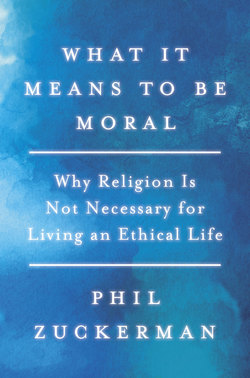Читать книгу What It Means to Be Moral - Phil Zuckerman - Страница 13
На сайте Литреса книга снята с продажи.
Оглавление5
Sally, Butch, and Plato’s Dilemma
So far, I’ve argued that theistic morality—the long-standing, traditional religious approach to morals and ethics in which God is necessarily central—is untenable for three reasons: 1) “God” is an indefinable, incomprehensible entity that has never been proven to exist; 2) even if this unfathomable entity referred to as God were somehow proven to exist, theists can’t ever agree on what it wants of us or how it expects us to live, so that theistic morality immediately disintegrates into a morass of competing, contradictory, and subjective interpretations; and 3) even if we could prove that God was real and even if we could all agree on exactly what it wants, then this would suddenly mean that our only duty would be to obey God’s commands, which directly results in flagrant moral outsourcing, thereby destroying a true human morality based on choice, freedom, consideration, conscience, deliberation, reflection, sympathy, empathy, and compassion.
But there’s something even more deeply problematic with morality based on faith in God than these three matters—something so ontologically and epistemologically insurmountable that no theologian has even been able to dull the biting, brilliant edge of its premise. In order to explain just what this something is—and in homage to the classical Socratic tradition of illustrating philosophical insights through didactic dialogue—I’d like to begin this final critique of theistic morality in the form of a conversation between two acquaintances, Butch and Sally.
It was a Monday morning, around seven, in Eastern Kentucky. Butch, age thirty-five, was sitting on a wooden bench in front of the Rowan County Courthouse. No one else was around, and the courthouse wouldn’t be open for another hour. But Butch was already there, and his spine was taut and he was eager—he wanted to be sure to be the first in to see the district attorney.
At around seven thirty, a woman the same age as Butch walked up to the entrance of the courthouse. She peered reluctantly into the glass of the two large, locked doors. And then Butch realized that he knew her.
“Sally?”
“Uh, yes . . . and you are . . .?”
“Butch Sanders. From high school.”
“Oh, my goodness—Butch—how are you?”
“I’m just fine. And you?”
“Good, yes—I mean—other than the fact that I’ve been called in to see the D.A.”
Butch scooted over to the right side of the bench and gestured for Sally to sit down.
“So nice to see you,” Sally said.
“You, too. Been a long time,” Butch acknowledged.
“You look great. I mean, you look—”
“Different? I know. It’s true. I was pretty scrappy back then.”
“No, I wouldn’t say that.”
